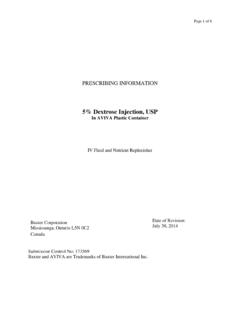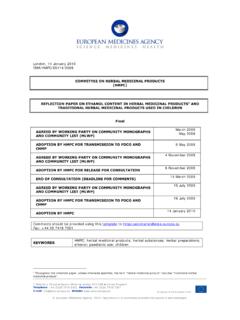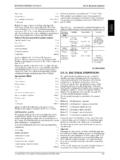Transcription of Pharmacopoeial standards - who.int
1 440 WHO Drug Information Vol. 29, No. 4, 2015 Pharmacopoeial standardsEnsuring the efficacy of a deworming medicine: albendazole chewable tablets Parasitic infections affect more than a billion people worldwide, many of them children. Albendazole chewable tablets are an effective treatment and can be administered by non-medical staff such as parents and teachers. However, chewable tablets are sometimes swallowed whole, either intentionally or unintentionally. The International Pharmacopoeia therefore requires that chewable tablets like conventional tablets comply with the tests for disintegration and dissolution.
2 The monograph included in The International Pharmacopoeia for albendazole chewable tablets was revised recently. It provides publicly available quality standards , including a new test for the dissolution of these widely used pharmaceutical quality of essential medicinesPharmacopoeial standards help ensure the quality and safety of essential medicines by providing analytical methods and appropriate limits for testing and assessing the active pharmaceutical ingredients, excipients and finished products. The International Pharmacopoeia1 focuses on specifying the quality of essential medicines, those medicines that satisfy the health care needs of the majority of the population in WHO Member States.
3 It underpins some of WHO s most important activities, including those 1 Publicly available at: out by the WHO Prequalification Team: medicines and the Department of Control of Neglected Tropical Diseases, to assess and test the quality of medicines found in: the WHO Model List of Essential Medicines and the WHO Model List of Essential Medicines for Children; invitations to manufacturers to submit an expression of interest for product evaluation to the World Health Organization (WHO) Prequalification Team: medicines; and/or other United Nations/WHO documents recommending the use of specific medicines for treating specific diseases and/or for use by treatment provides The International Pharmacopoeia free of charge for WHO Member States to enable quality control testing of active ingredients and finished pharmaceutical products.
4 An example of how these global specifications provide added value for WHO Member States was published in a previous edition of this journal*.In 2015, publication of the Fifth Edition of The International Pharmacopoeia (Ph. Int.) and the 50th annual meeting of the WHO Expert Committee which is mandated to keep it relevant and updated, represented two major landmarks. The paper presented here describes another example of a monograph, newly included in the Fifth Edition of Ph. Int., that contributes to bringing affordable, safe and efficacious medicines of good quality to everyone, everywhere.
5 * Global specifications: the example of capreomycin. WHO Drug Information 2014; 28(4):431-3. 441 WHO Drug Information Vol. 29, No. 4, 2015 Pharmacopoeial standardsPriority is placed on monograph development for essential medicines that are not included or not sufficiently described in other pharmacopoeias. Many of these medicines are needed urgently, either because current production does not cover global treatment needs or because available products are not quality-assured. Albendazole chewable tablets is one such : a needed treatmentAlbendazole is an effective treatment for a range of parasitic diseases that represent a significant public health burden, as described filariasisLymphatic filariasis, commonly known as elephantiasis, is a neglected tropical disease.
6 It is caused by parasitic infection with nematodes (roundworms) of the family Filariodidea that are transmitted by mosquitoes. It is usually acquired in childhood and damages the lymphatic system. The painful and profoundly disfiguring visible manifestations of the disease occur later in life and lead to permanent disability. Patients are not only physically disabled, but suffer mental, social and financial losses contributing to stigma and poverty. Currently, billion people in 58 countries live in areas where lymphatic filariasis is transmitted and are at risk of being infected.
7 Lymphatic filariasis can be eliminated by stopping the spread of the infection through use of large-scale chemoprevention, consisting of a single dose of two medicines albendazole chewable tablets (400 mg) together with ivermectin tablets (150 200 g/kg) or with diethylcarbamazine tablets (DEC) (6 mg/kg) given annually to an entire at-risk population. (1)Soil-transmitted helminth infectionsSoil-transmitted helminth infections are among the most common infections worldwide. They are transmitted by eggs present in human faeces which in turn contaminate soil especially in areas where sanitation is poor.
8 The main species that infect people are the roundworm (Ascaris lumbricoides), the whipworm (Trichuris trichiura) and hookworms (Necator americanus and Ancylostoma duodenale).More than billion people, or 24% of the world s population, are infected with soil-transmitted helminth infections. Over 270 million preschool-age children and over 600 million school-age children live in areas with high transmission rates of these parasites and are in need of treatment and preventive interventions. The WHO recommended medicines albendazole chewable tablets and mebendazole chewable tablets are effective, inexpensive and easy to administer by non-medical personnel, for example teachers.
9 (2)Chewable tablets: a question of definitionPharmacopoeias define chewable tablets differently. The definitions deviate from each other in particular with regard to administration (must be chewed or may be chewed) and, consequently, not all pharmacopoeias require a disintegration test (Box 1). In The International Pharmacopoeia, a disintegration requirement has been included to address concerns about the efficacy of chewable tablets that are swallowed whole, either intentionally or unintentionally. Pharmacopoeial standards WHO Drug Information Vol.
10 29, No. 4, 2015442 The need for dissolution testingMonographs for solid oral dosage forms in The International Pharmacopoeia usually contain a dissolution test and/or a disintegration test. The choice of testing disintegration or dissolution for a given product is based on international standards such as the International Council for Harmonisation (ICH) guideline on Test Procedures and Acceptance Criteria for New Drug Products (3). This guideline advises that disintegration testing may be sufficient for rapidly dissolving medicines containing active ingredients that are highly soluble in the body.















